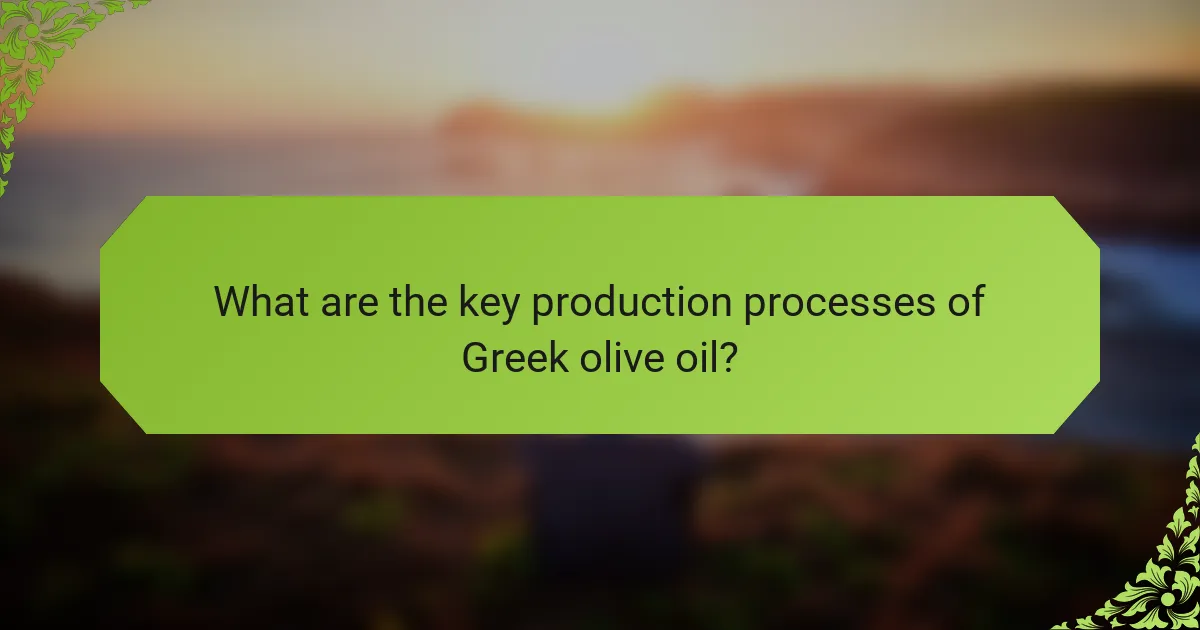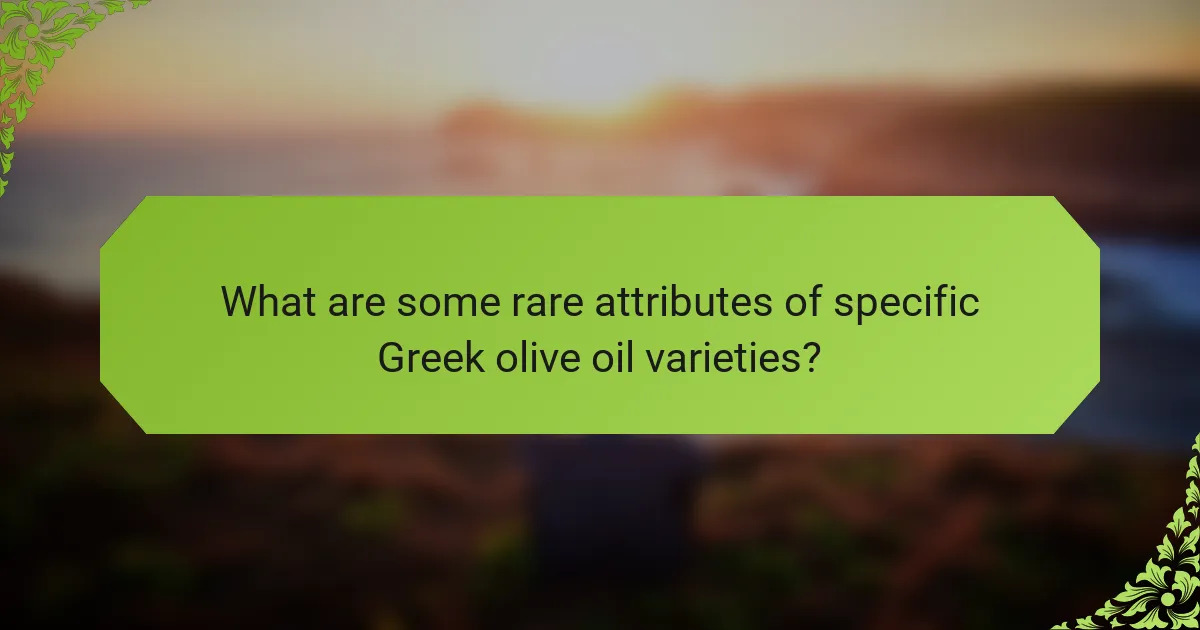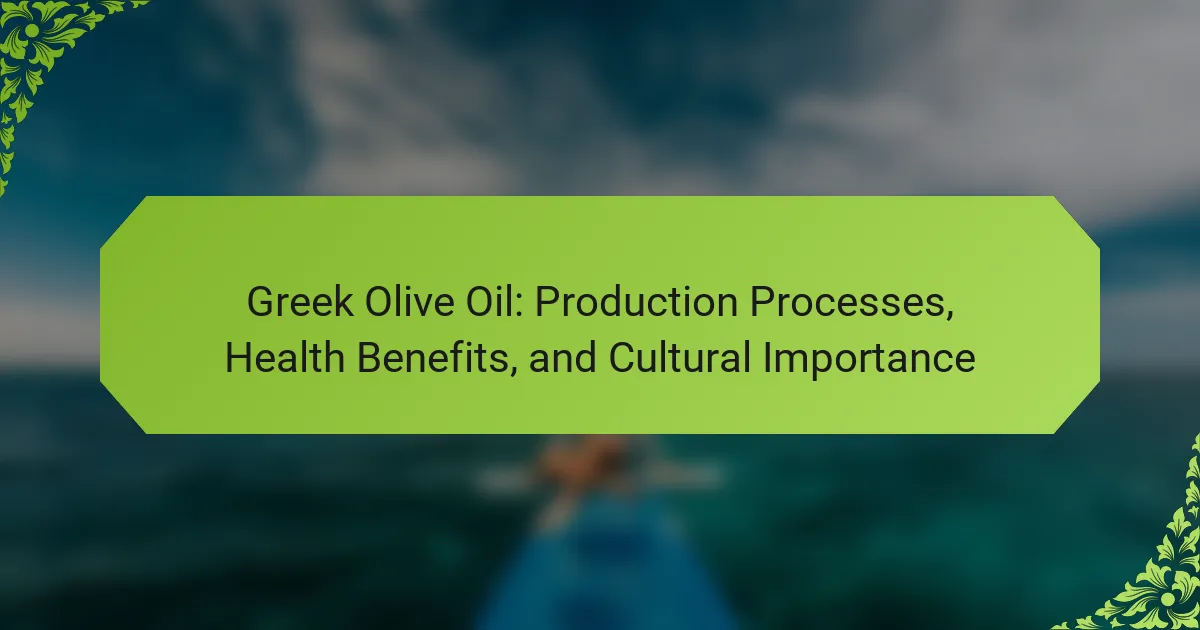Greek olive oil is renowned for its health benefits, including heart health and anti-inflammatory properties. This article explores the key production processes, such as harvesting and extraction, that contribute to its quality. It also examines the cultural significance of olive oil in Greek society and highlights unique varieties with exceptional attributes. Understanding these aspects can enhance appreciation for this staple of Mediterranean cuisine.

What are the key production processes of Greek olive oil?
The key production processes of Greek olive oil include harvesting, crushing, malaxation, and extraction. These processes ensure high-quality oil with distinct flavors and health benefits.
Harvesting involves hand-picking olives to avoid damage, preserving their quality. Crushing follows, where olives are ground into a paste. Malaxation is the mixing of the paste to facilitate oil separation. Finally, extraction uses mechanical or chemical methods to separate oil from the paste, resulting in the final product.
Each step is crucial in maintaining the oil’s unique attributes, such as its low acidity and rich polyphenol content, which contribute to its health benefits. The meticulous production process reflects the cultural importance of olive oil in Greek heritage.
How is olive oil harvested in Greece?
Olive oil in Greece is harvested primarily through hand-picking or mechanical methods. Hand-picking ensures the quality of the olives, while mechanical harvesting increases efficiency. The harvest typically occurs between late September and early November, depending on the olive variety and region. After harvesting, olives are transported to mills for immediate processing, preserving their flavor and health benefits. This traditional practice reflects Greece’s cultural importance of olive oil, which is deeply rooted in its history and cuisine.
What methods are used for olive oil extraction?
The primary methods used for olive oil extraction include cold pressing, hot pressing, and solvent extraction. Cold pressing maintains the oil’s flavor and nutritional value by using mechanical means without heat. Hot pressing involves heat to increase yield but may reduce quality. Solvent extraction uses chemicals to maximize oil extraction, often resulting in lower quality oil. Each method impacts the oil’s flavor, aroma, and health benefits.
How does the quality of olives impact the oil produced?
The quality of olives significantly influences the flavor, aroma, and health properties of the oil produced. High-quality olives yield oil with superior taste and nutritional benefits. Factors like ripeness, variety, and cultivation methods determine olive quality, impacting oil attributes such as acidity and antioxidant levels. For instance, cold-pressed oils from fresh, healthy olives retain more nutrients and exhibit enhanced sensory characteristics compared to oils from overripe or damaged olives.

What are the health benefits associated with Greek olive oil?
Greek olive oil offers numerous health benefits, primarily due to its high content of monounsaturated fats and antioxidants. It promotes heart health by reducing bad cholesterol levels and lowering blood pressure. Additionally, it has anti-inflammatory properties that may help reduce the risk of chronic diseases. The presence of polyphenols contributes to improved brain function and may lower the risk of cognitive decline. Furthermore, Greek olive oil supports digestive health and enhances nutrient absorption. Its unique flavor and quality are often attributed to traditional production processes, which preserve its beneficial properties.
Which nutrients are found in Greek olive oil?
Greek olive oil contains essential nutrients including monounsaturated fats, vitamin E, and antioxidants. These components contribute to its health benefits, such as reducing inflammation and promoting heart health. The unique composition of Greek olive oil, particularly its high oleic acid content, distinguishes it from other oils.
How does Greek olive oil contribute to heart health?
Greek olive oil significantly contributes to heart health due to its high content of monounsaturated fats and antioxidants. These components help reduce bad cholesterol levels and inflammation, promoting better cardiovascular function. Studies indicate that regular consumption of Greek olive oil can lower the risk of heart disease. Its unique attribute, the high concentration of oleocanthal, provides anti-inflammatory benefits comparable to ibuprofen. Additionally, the Mediterranean diet, rich in Greek olive oil, is associated with improved heart health outcomes.
What role does Greek olive oil play in anti-inflammatory diets?
Greek olive oil is essential in anti-inflammatory diets due to its high levels of monounsaturated fats and antioxidants. These components help reduce inflammation markers in the body, promoting overall health. The phenolic compounds in Greek olive oil, such as oleocanthal, exhibit similar effects to ibuprofen in reducing inflammation. Incorporating this oil into meals can enhance flavor while providing significant health benefits. Regular consumption supports heart health and may lower the risk of chronic diseases linked to inflammation.

Why is Greek olive oil culturally significant?
Greek olive oil is culturally significant due to its deep historical roots and role in daily life. It symbolizes health, tradition, and craftsmanship in Greek society. The production process involves meticulous harvesting and pressing methods, ensuring high quality. Greek olive oil is renowned for its health benefits, including heart health and anti-inflammatory properties. Additionally, it plays a vital role in culinary practices, rituals, and hospitality, making it a cornerstone of Greek culture.
How does Greek olive oil feature in traditional Mediterranean cuisine?
Greek olive oil is essential in traditional Mediterranean cuisine, enhancing flavors and promoting health. Its production involves cold pressing, preserving nutrients and taste. Rich in monounsaturated fats and antioxidants, it contributes to heart health and reduces inflammation. Culturally, it symbolizes hospitality and is a staple in dishes like salads, dips, and marinades.
What festivals celebrate olive oil production in Greece?
Several festivals in Greece celebrate olive oil production, highlighting its cultural significance. The most notable include the Olive Oil Festival in Sparta, which showcases local varieties and production methods, and the Kalamata Olive Festival, featuring tastings and traditional music. Other events include the Olive Oil Festival in Crete and the Olive Oil Celebration in the Peloponnese, both emphasizing the health benefits and culinary uses of olive oil. These festivals promote local heritage and educate visitors on sustainable practices.
How is Greek olive oil integrated into local customs and rituals?
Greek olive oil plays a vital role in local customs and rituals, symbolizing health and prosperity. It is commonly used in religious ceremonies, such as baptisms and weddings, where it represents purity and blessings. Additionally, olive oil is integral to traditional Greek cuisine, enhancing the flavor of various dishes and emphasizing the Mediterranean diet’s health benefits. In festivals, olive oil is often featured in competitions, showcasing its importance in agricultural heritage. Overall, its cultural significance is deeply rooted in Greek identity and daily life.

What are the unique attributes of premium Greek olive oil?
Premium Greek olive oil possesses unique attributes that enhance its quality and appeal. These include its high polyphenol content, which contributes to its health benefits, and its distinct flavor profile that varies by region. The oil’s cold extraction process ensures minimal processing, preserving its natural characteristics. Unique varieties, such as Koroneiki, are renowned for their rich taste and low acidity. Additionally, premium Greek olive oil often has a Protected Designation of Origin (PDO) status, ensuring authenticity and quality.
How does the region of origin affect flavor profiles?
The region of origin significantly influences the flavor profiles of Greek olive oil. Factors such as climate, soil composition, and traditional production methods contribute to distinct taste characteristics. For instance, oils from Crete often exhibit fruity notes, while those from Kalamata are known for their peppery finish. These variations arise from unique attributes of local olive cultivars and the specific harvesting techniques employed. The cultural importance of these oils further enhances their flavor complexity, as traditional practices are passed down through generations, emphasizing quality and authenticity.
What certifications and designations distinguish high-quality Greek olive oil?
Certifications and designations that distinguish high-quality Greek olive oil include Protected Designation of Origin (PDO) and Protected Geographical Indication (PGI). These labels ensure authenticity and adherence to strict production standards. PDO guarantees that the olive oil is produced, processed, and prepared in a specific region, while PGI indicates that at least one phase of production occurs in the designated area. Additional certifications, such as organic and extra virgin, further enhance the oil’s quality and health benefits.

What are some rare attributes of specific Greek olive oil varieties?
Certain Greek olive oil varieties possess rare attributes that enhance their uniqueness. For example, the Koroneiki variety is known for its exceptional fruitiness and low acidity, often exhibiting a peppery finish. The Lianolia variety is distinguished by its high oleic acid content, contributing to its health benefits. Another rare trait can be found in the Tsounati variety, which is celebrated for its aromatic complexity, often reminiscent of herbs and spices. These unique attributes set specific Greek olive oils apart, highlighting their cultural and culinary significance.
How do indigenous olive tree species influence oil characteristics?
Indigenous olive tree species significantly influence the characteristics of Greek olive oil. Their unique attributes, such as flavor profiles and oil composition, determine the oil’s taste, aroma, and health benefits. For instance, the Koroneiki variety is known for its high polyphenol content, enhancing both flavor and health properties. Additionally, the terroir, including soil and climate, further shapes the oil’s sensory qualities. This interplay of indigenous species and environmental factors results in a diverse range of olive oils, each with distinct characteristics.
What unique flavor notes can be found in limited-edition Greek olive oils?
Limited-edition Greek olive oils often showcase unique flavor notes such as green apple, artichoke, and almond. These oils are crafted from specific olive varieties and harvested at peak ripeness, enhancing their distinct profiles. The region’s terroir contributes to variations in taste, with factors like soil composition and climate influencing the final product. Some limited editions may also exhibit rare attributes like floral or herbal undertones, setting them apart in the culinary world.

What best practices should be followed when using Greek olive oil?
To maximize the benefits of Greek olive oil, use it in moderation, store it properly, and choose high-quality varieties. First, consume it raw or drizzle it over dishes to preserve its flavor and nutrients. Store olive oil in a cool, dark place to prevent oxidation. Select extra virgin olive oil for its superior health benefits, including antioxidants and healthy fats.
How can one properly store Greek olive oil for optimal freshness?
To store Greek olive oil for optimal freshness, keep it in a cool, dark place in a tightly sealed container. Exposure to light and heat can degrade its quality. Use dark glass bottles or metal tins to protect it from light. Additionally, ensure the container is airtight to prevent oxidation. Aim to consume the oil within 12 to 18 months for the best flavor and health benefits.
What are common mistakes to avoid when cooking with Greek olive oil?
Common mistakes to avoid when cooking with Greek olive oil include using it at high temperatures, which can degrade its flavor and health benefits. Additionally, storing it improperly, such as in light or heat, can lead to rancidity. Overusing olive oil can mask the flavors of other ingredients, while not using enough can result in dryness. Finally, failing to choose high-quality, extra virgin olive oil diminishes the overall dish quality.
How can Greek olive oil be incorporated into a balanced diet?
Greek olive oil can enhance a balanced diet through its healthy fats and antioxidants. Incorporate it in salad dressings, marinades, or as a finishing oil on cooked dishes. Its monounsaturated fats support heart health, while polyphenols provide anti-inflammatory benefits. Use Greek olive oil to replace less healthy fats, promoting overall wellness.



